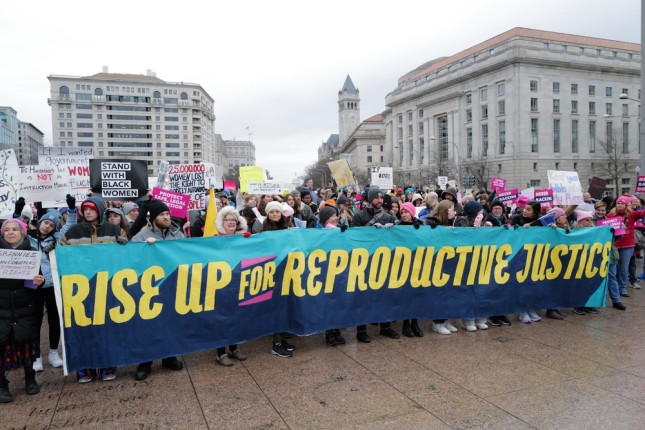-
Sexual and Reproductive Justice: A Vehicle in Progress
March 8, 2023 By Maanasa Chitti
The pace of change towards advancing sexual and reproductive health and rights is piecemeal and far too slow, said Dr. Natalia Kanem, Executive Director of the United Nations Population Fund (UNFPA), at a recent panel hosted by The Columbia University Global Health Justice & Governance Program (GHJG), in partnership with UNFPA, Columbia World Projects, and the Ford Foundation. The event launched the November 2022 report, Sexual and reproductive justice as the vehicle to deliver the Nairobi Summit commitments, published by the High-Level Commission on the Nairobi Summit on ICPD25 Follow-up.
Despite progress since the landmark International Conference on Population and Development in 1994, the movement to advance sexual and reproductive health and rights (SRHR) still faces strong headwinds globally. These challenges include the COVID-19 pandemic, increasing humanitarian conflicts, and climate-related disasters – such as the recent earthquakes in Türkiye and Syria. Yet, Dr. Kanem said that halting progress on these issues spells life and death for women and girls, people of color, Indigenous peoples, LGBTQI activists, people living with HIV, and other marginalized groups.
Black and Indigenous women, as well as other women of color, have historically been rendered invisible, even in the early, mainstream, and so-called “progressive” reproductive rights movements, noted Nicolette Naylor, who co-authored the report. Speaking as a pan-African feminist lawyer, Naylor emphasized the importance of using a sexual and reproductive justice framework, “because breaking silos requires us to acknowledge and overcome the cross-cutting pervasive challenges that impact reproductive health services.”
Naylor noted that a sexual and reproductive justice framework requires policies to be intersectional to be effective. “This framework requires us to do a power analysis that looks beyond the health system and also considers the education system, criminal justice system, law enforcement, housing, and child welfare.”
Roles for Funders and the Private Sector
Terry McGovern, the Director of the Global Health Justice and Governance Program at Columbia University’s Mailman School of Public Health, noted that using a sexual and reproductive justice framework also holds funders accountable. Doing so requires funders to look upstream to the structural factors that result in marginalized groups being underfunded and the repetition of discriminatory laws and policies. “We have seen the need to respond to humanitarian crises and gender-based violence increase by 120 percent. But only 20 percent was funded,” said McGovern, who was the report’s lead author.
Malia Maier, a Senior Program Officer in the Global Health Justice and Governance Program, and another co-author of the report, said that there is a need to consider the role of the private sector that can and should be championing sexual and reproductive health. She also advocated for better accountability mechanisms to keep the momentum of SRHR moving forward.
McGovern noted that there is no mystery to the patterns faced by millions of women amid numerous humanitarian crises globally, which have included the detention, gang rape, and forced impregnation of Yugoslavian women, acts of sexual violence against Ukrainian refugees in Poland, and the ethnic cleansing committed in the Eastern region of the Democratic Republic of the Congo (DRC). She added that the sexual and reproductive justice framework asks governments, humanitarian development actors, and donors to anticipate and actively avoid these patterns.
McGovern also highlighted the need to dismantle unequal trends of resource distribution. Solutions can come not only through prioritizing local leadership but also from the most marginalized groups in a community.
A Mixed Report Card
Maier observed that while there have been setbacks towards progress on the commitments made in Nairobi, there have also been significant gains, as countries are integrating commitments from the 2019 summit into national plans and policies. Governments in Argentina, Mexico, Colombia, Sierra Leone, the DRC, and Benin have increased access to reproductive health services, including allowing for a more permissive legal environment regarding abortion and post-abortion care.
“There is still a long way to go to achieve our ‘three zeros’ goal,” said Dr. Kanem, referring to UNFPA’s strategic effort to achieve zero unmet need for contraception, zero preventable maternal mortality, and zero gender-based violence and harmful practices by 2030. She urged the global community to stand up for girls who depend on leaders and advocates to protect and defend their reproductive rights. “No exceptions.” said Dr. Kanem. “No exclusions.”
Read More:
- The Nairobi Summit on IPCD 25 reaffirmed commitments towards gender equality and SRHR.
- The United States and Latin America diverge with regards to abortion rights.
- According to the SRHR Index, the United States has made progress in SRHR since 2020.
Sources: Columbia University Mailman School of Public Health, Columbia World Projects, Ford Foundation, The Nairobi Summit Commitments on ICPD25, United Nations, United Nations Population Fund.
Photo Credit: Participants in the annual Women’s March demand reproductive justice. Phil Pasquini/Shutterstock.com
 A Publication of the Stimson Center.
A Publication of the Stimson Center.



